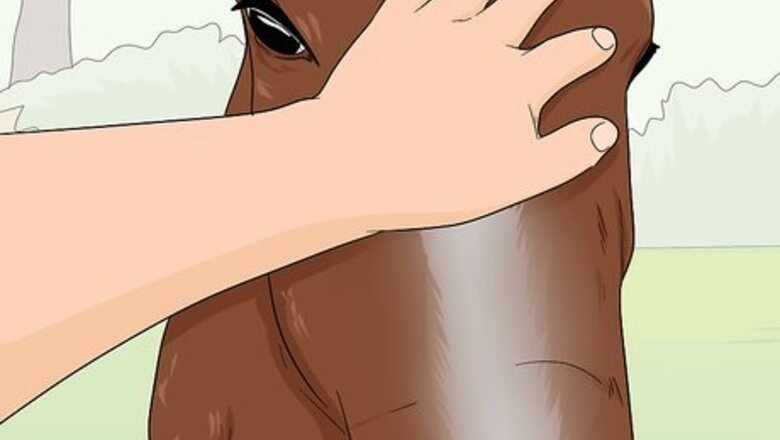
views
Avoiding Biting Situations
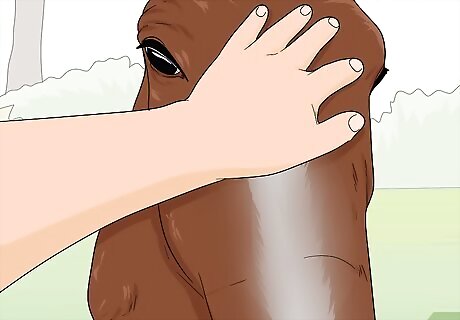
Establish yourself as the leader.(refer to round penning) (Horses are social creatures, and every herd has an alpha that the other horses follow and won't bite. Your horse biting you may be a sign of disrespect, a way of saying he is in charge instead of you. A good way to establish yourself is to keep his head front and center when you are working around him, including for grooming. If it starts to drift, either away from you or closer to you than you would like, use your hand to push it back where you need it to be for whatever activity you are doing. Pressure on his cheek or neck should get the point across that his head belongs where you want it to be. There are other general ways to make sure your horse respects you. Watch the rest of his body to make sure he is standing where you want him to, and if he is not, push him to move back. If you are riding him, don't let him wander off in directions other than the one you want him to go. If he does that, make him stop, and lead him in your direction, not his. If he is a young colt, or has been allowed to misbehaved in the past, you will probably need to do these things several times for him to get the message. Keep your responses consistent, and he will learn.
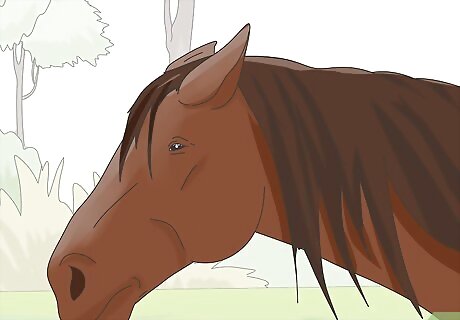
Watch for aggressive body language. The most common sign for aggression in a horse is for him to pin his ears back. You may also see other signs of nervousness or discomfort with the pinned ears like lowering his head, or stamping his feet. If your horse looks like he is in a bad or aggressive mood, be prepared to reprimand him, or step away so he doesn't have the opportunity to bite. A number of different things can cause aggression in horses. Usually, it is a sign of unease, which come from being in an unfamiliar location, meeting new people or horses, or even boredom. In general, it is best to remove your horse from a situation where he begins acting aggressively. Otherwise, try to keep his day busy and activities varied to prevent boredom and encourage good social behavior with other horses.
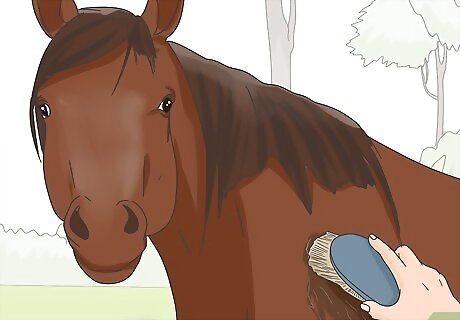
Don't let your horse groom you. When you brush or groom your horse, he will try to groom you with his mouth in return. If he turns his head to you, stop brushing to let him know that he does not need to reciprocate with you. If he gets aggressive turning his head toward you, use your hand to push him back, and stop brushing until he turns forward again.
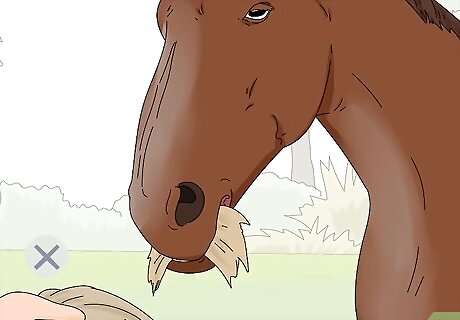
Don't hand-feed your horse. Because of where their eyes are, horses can't see in front of their mouth. They may use their teeth to get a feel for where they are, and start biting. Hand-feeding like this also lets your horse get too comfortable with his mouth on or near your hands, making a bite too tempting. He is also more likely to become aggressive if someone doesn't give him the food he is expecting. If lots of people interact with your horse (say at a riding barn), and have been hand-feeding him, have them stop immediately. You don't want the horse associating hand-feeding with others. This will make him more likely to bite as he gets frustrated with new people that don't feed him. This is especially true if they are being hand-fed by people who don't know what they are doing. Your horse may go through an aggressive period where he won't understand why he isn't being fed, but that will pass as long as you are consistent with this new treatment.
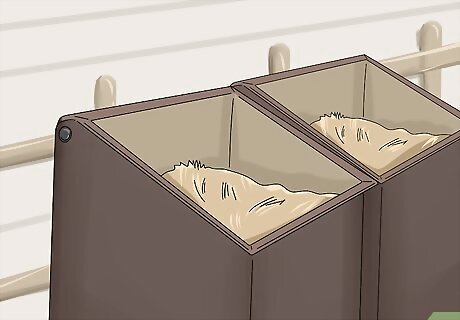
Leave hay in the stable. This is useful for teething horses, so they always have something to chew on. Without it, they will gnaw on the wood in their stables, and be more willing to bite you to deal with the irritating feel.
Punishing Bad Behavior
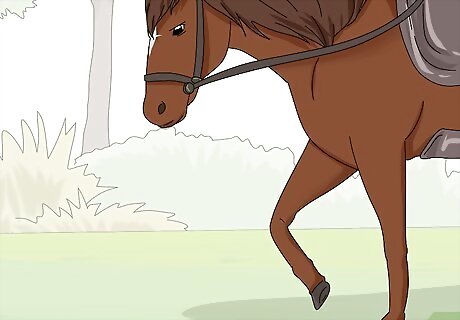
Look for signs of discomfort. Horses sometimes bite as a way to express their irritation at pain or other discomfort. You don't want to punish a horse for expressing pain. Check your horse's equipment, making sure everything fits properly and has been put on correctly, and keep an eye out for injuries. Check your horse's equipment to make sure it fits properly and is the appropriate tightness. This is especially true for tack equipment such as the saddle and bridle. If it is either too tight or too loose, it will not feel right to the horse. Always make sure your gear, especially pieces made from leather, are clean and sturdy. This will prevent irritation to your horse, and make it less likely for you to have an accident from a broken tack. Check your horse's shoes as well. Make sure they are clean, don't have any impediments, and fit properly. If there is an issue, contact your farrier to have the shoes adjusted or reshod. Eye injuries are also a common problem for horses. If your horse is squinting or tearing up, you notice his lids swelling, his corneas becoming opaque, or facial asymmetry (each eye looks different), check with your veterinarian to determine the problem.
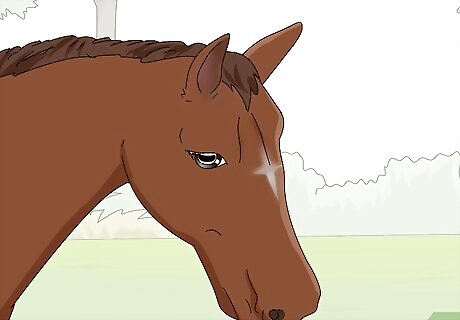
Give the horse a quick smack on the muzzle. If your horse nips you, quickly strike him with an open palm. This should be a quick smack, almost like a reflexive swat. A big windup or additional screaming and flailing will only confuse your horse. It can be helpful to add a loud “Stop!” or “Knock it off!” to increase the shock for your horse. Adding language can also help train the horse to recognize verbal commands, so that eventually saying “Stop!” will help prevent biting without the physical contact. Alternatively, have a rope nearby. If a colt starts nipping, give him a swish with the rope. This mimics the response he would get from an older horse's tail, reminding the colt who is in charge. If you aren't comfortable striking the horse, you can also use your thumb and forefinger to twitch him between the nostrils on his nose or his neck. It won't hurt him, just give an unpleasant shock that he won't want repeated.
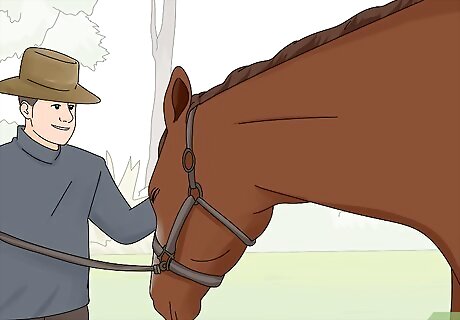
Reward good behavior. You want your horse to know that doing the right thing will be rewarded. If he follows your punishment by staying back or holding his head still, give him a soft pat or rub on the shoulder. It can be a good idea to reward your horse immediately after punishing him. This can help reestablish trust, and let him know he is now doing the right thing, that is standing still rather than trying to bite.
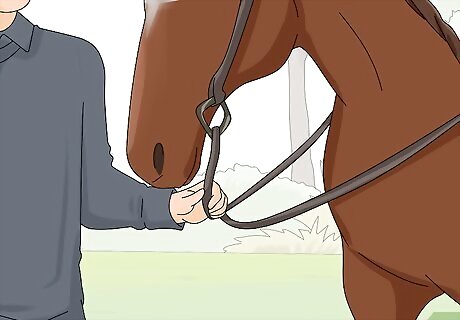
Always respond quickly. Whatever you do to respond to a bite or attempted bite, make sure it happens immediately. The horse needs to know that the punishment is tied to his biting. If you think you see it coming, that he is moving to bite you, go ahead and act preemptively. This also means responding early in your horse's life. Young colts nip because they don't always know better. If your horse gives you a little nibble, respond as you would if it were a full bite. This can help prevent bad habits from getting worse as your horse gets older. It is never too soon to let your horse know what isn't appropriate, so he can understand the right way to act.















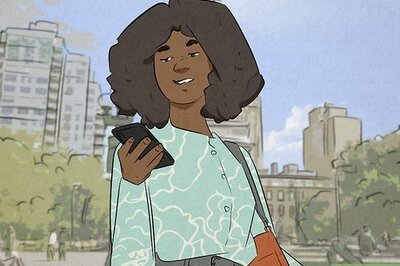



Comments
0 comment